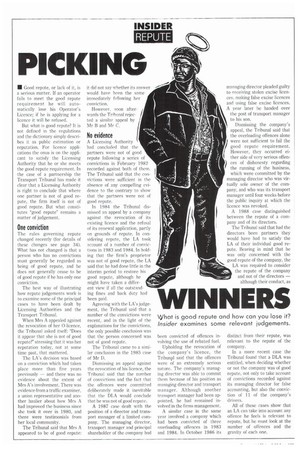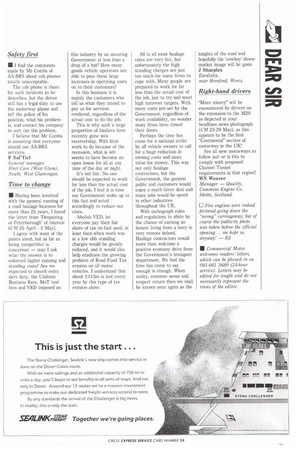PICKING
Page 30

Page 31

If you've noticed an error in this article please click here to report it so we can fix it.
• Good repute, or lack of it, is a serious matter. If an operator fails to meet the good repute requirement he will automatically lose his Operator's Licence; if he is applying for a licence it will be refused.
But what is good repute? It is not defined in the regulations and the dictionary simply describes it as public estimation or reputation. For licence applications the onus is on the applicant to satisfy the Licensing Authority that he or she meets the good repute requirement. In the case of a partnership the Transport Tribunal has made it clear that a Licensing Authority is right to conclude that where one partner is not of good repute, the firm itself is not of good repute. But what constitutes "good repute" remains a matter of judgement.
One conviction
The rules governing repute changed recently (for details of these changes see page 34). What has not changed is that a person who has no convictions must generally be regarded as being of good repute, and he does not generally cease to be of good repute if he has only one conviction.
The best way of illustrating how repute judgements work is to examine some of the principal cases to have been dealt by Licensing Authorities and the Transport Tribunal.
When Mrs A appealed against the revocation of her 0-licence, the Tribunal asked itself: "Does it appear that she is not of good repute?" stressing that it was her reputation today, not at some time past, that mattered.
The LA's decision was based on a conviction which had taken place more than five years previously — and there was no evidence about the extent of Mrs A's involvement. There was evidence from a traffic examiner, a union representative and another haulier about how Mrs A had improved the business since she took it over in 1980, and there were testimonials from her local community.
The Tribunal said that Mrs A appeared to be of good repute: it did not say whether its answer would have been the same immediately following her conviction.
However, soon afterwards the Tribunal rejected a similar appeal by Mr B and Mr C.
No evidence
A Licensing Authority had concluded that the partners were not of good repute following a series of convictions in February 1982 recorded against both of them. The Tribunal said that the convictions were sufficient in the absence of any compelling evidence to the contrary to show that the partners were not of good repute.
In 1984 the Tribunal dismissed an appeal by a company against the revocation of its existing licence and the refusal of its renewal application, partly on grounds of repute. In considering repute, the LA took account of a number of convictions in 1983 and 1984. In holding that the firm's proprietor was not of good repute, the LA said that he had done little in the interim period to restore his good repute, although he might have taken a different view if all the outstanding fines and back duty had been paid.
Agreeing with the LA's judgement, the Tribunal said that a number of the convictions were recent, and in the light of the explanations for the convictions, the only possible conclusion was that the person concerned was not of good repute.
The Tribunal came to a similar conclusion in the 1985 case of Mr D.
Dismissing an appeal against the revocation of his licence, the Tribunal said that the number of convictions and the fact that the offences were committed deliberately made it inevitable that the DLA would conclude that he was not of good repute.
A 1987 case dealt with the position of a director and transport manager of a limited company. The managing director, transport manager and principal shareholder of the company had been convicted of offences involving the use of rebated fuel.
Upholding the revocation of the company's licence, the Tribunpl said that the offences were of an extremely serious nature. The company's managing director was able to commit them because of his position as managing director and transport manager. Although another transport manager had been appointed, he had remained involved in the firms management.
A similar case in the same year involved a company which had been convicted of three overloading offences in 1983 and 1984. In October 1986 its managing director pleaded guilty to receiving stolen excise licences, making false excise licences and using false excise licences. A year later he handed over the post of transport manager to his son.
Dismissing the company's appeal, the Tribunal said that the overloading offences alone were not sufficient to fail the good repute requirement. However, they occurred either side of very serious offences of dishonesty regarding the running of the business, which were committed by the managing director who was virtually sole owner of the company, and who was its transport manager until four weeks before the public inquiry at which the licence was revoked.
A 1988 case distinguished between the repute of a company and of its directors.
The Tribunal said that had the directors been partners they would have had to satisfy the LA of their individual good repute. Bearing in mind that he was only concerned with the good repute of the company, the LA was required to consider the repute of the company and not of the directors — although their conduct, as distinct from their repute, was relevant to the repute of the company.
In a more recent case the Tribunal found that a DLA was entitled, when deciding whether or not the company was of good repute, not only to take account of convictions recorded against its managing director for false accounting, but also the conviction of 11 of the company's drivers.
All of these cases show that an LA can take into account any offence he feels is relevant to repute, but he must look at the number of offences and the gravity of each one.
Safety first
• I find the comments made by Mr Combs of AA-BRS about cab phones totally unacceptable.
The cab phone is there for such incidents as he describes, but the driver still has a legal duty to use the motorway phone and tell the police of his position, what his problem is, and contact his company to sort out the problem.
I believe that Mr Combs is assuming that everyone should use AA-BRS services.
F Sal'Tiel General manager, Fleet Care (West Clam), Neath, West Glamorgan.
Time to change
N Having been involved with the general running of a road haulage business for more than 25 years, I found the letter from 'Despairing of Peterborough' of interest (CM 25 April 2 May), I agree with most of the points aired, but as far as being competitive is concerned — may I ask what the answer is to enforced higher running and standing costs? Are we expected to absorb extra dery duty, the Uniform Business Rate, MoT test fees and VED imposed on this industry by an uncaring Government at less than a drop of a hat? How many goods vehicle operators are able to pass these large increases in operating costs on to their customers?
In this business it is mainly the customers who tell us what they intend to pay us for services rendered, regardless of the actual cost to do the job.
This is why such a large proportion of hauliers have recently gone into receivership. With little work to do because of the recession, what is left seems to have become an open house for all at any time of the day or night.
It's not fair. No one should be expected to work for less than the actual cost of the job. I feel it is time our Government woke up to this fact and acted accordingly to reduce our costs.
Abolish VED, let everyone pay their fair share of tax on fuel used, at least then when work was at a low ebb standing charges would be greatly reduced, and it would also help eradicate the growing problem of Road Fund Tax evasion on all motor vehicles. I understand that about £113m is lost every year by this type of tax evasion alone. All in all most haulage rates are very fair, but unfortunately the high standing charges are just too much for many firms to cope with. Many people are prepared to work for far less than the actual cost of the job, just to try and meet high turnover targets. With many costs pre-set by the Government, regardless of work availability, no wonder many firms have closed their doors.
Perhaps the time has come for a national strike by all vehicle owners to call for a huge reduction in owning costs and more value for money. This way not only haulage contractors, but the Government, the general public and customers would enjoy a much fairer deal and many jobs would be saved in other industries throughout the UK.
With tachograph rules and regulations to abide by the chance of earning an honest living from a lorry is very remote indeed. Haulage contractors would more than welcome a positive economy drive from the Government's transport department. We feel the time has come to say enough is enough. When sanity, common sense and respect return then we shall be known once again as the knights of the road and hopefully the 'cowboy' downmarket image will be gone. J Sharpies Eardisley, near Hereford, Worcs.
Right-hand drivers
"More misery" will be encountered by drivers on the extension to the M20 as depicted in your headlines news photograph (CM 23-29 May), as this appears to be the first "Continental" section of motorway in the UK!
Are all new motorways to follow suit or is this to comply with proposed Channel Tunnel requirements in that region? WN Weaver Manager — Quality, Cummins Engine Co, Shotts, Scotland.
0 Fire engines were indeed pictured going down the "wrong" carriageway, but of course the publicity photo was taken before the official opening.., we hope so, anyway! — Ed




































































































